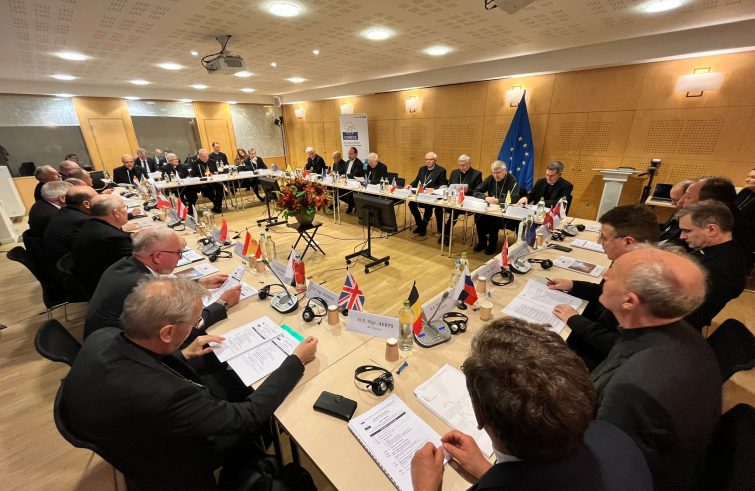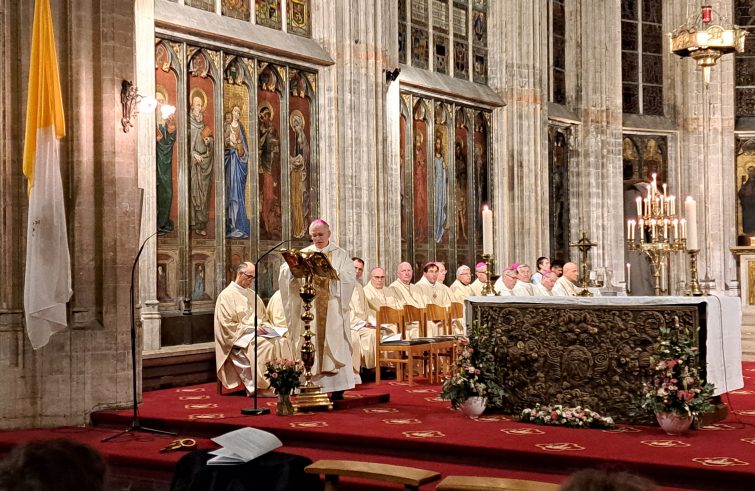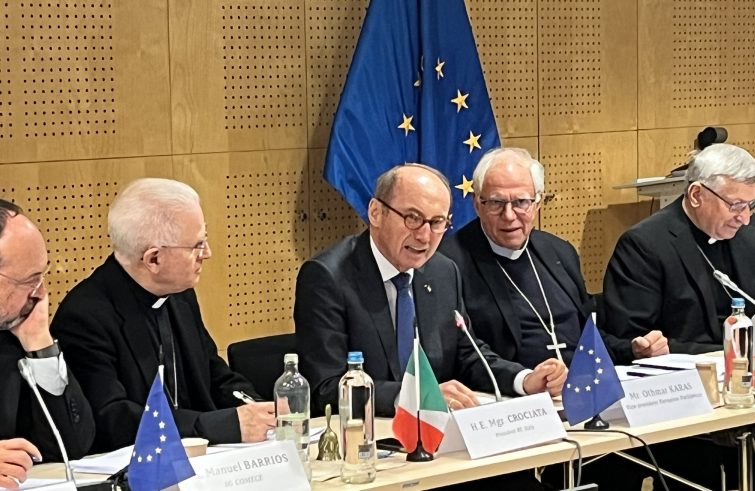
(From Brussels). For the European Union and those serving in its institutions, that they may be guided and inspired by the example of the founding fathers of the European project. For peace in the world, so that the spiral of hatred that is causing so many deaths, especially in Ukraine and the Holy Land, may come to an end. For the victims of violence, especially children, women and the elderly. At a time when the ongoing conflicts show no sign of diminishing and are even escalating, the bishops delegates of the Bishops’ Conferences of the European Union – gathered in Brussels for the COMECE Autumn Plenary Assembly – convened in the church of Notre-Dame des Victoires au Sablon, in the heart of Europe.
“We believe that God guides the course of history,” said Msgr. Mariano Crociata, President of COMECE, in his homily, “but we also believe that he does so by asking us to be willing to be guided by the light of His wisdom and love.”
 The Plenary Assembly opened with an overview of the most critical conflicts in Europe and the Middle East and their impact on European societies. Almost two years have passed since the outbreak of Russia’s aggression against Ukraine and, unfortunately, the war still has no end in sight. This was followed on October 7 by the terrorist attack by Hamas against Israel, triggering a conflict that threatens the stability of the entire region. During the three-day meeting, the bishops will have the opportunity to dialogue with Archbishop Schevchuk, head of the Ukrainian Greek Catholic Church, and listen to the testimony of Patriarch Pizzaballa. “It will be an opportunity to express our full solidarity with the suffering of the faithful,” said Mgr Crociata, “and to reiterate our rejection of terrorism as a method of political struggle, our condemnation of all forms of violation of international law and respect for borders and for the dignity and integrity of every nation. The bishops are particularly concerned about “the victims of violence, especially civilians, children, women and the elderly, the disruption of the lives of so many families, the immense suffering of the wounded and the displaced.”
The Plenary Assembly opened with an overview of the most critical conflicts in Europe and the Middle East and their impact on European societies. Almost two years have passed since the outbreak of Russia’s aggression against Ukraine and, unfortunately, the war still has no end in sight. This was followed on October 7 by the terrorist attack by Hamas against Israel, triggering a conflict that threatens the stability of the entire region. During the three-day meeting, the bishops will have the opportunity to dialogue with Archbishop Schevchuk, head of the Ukrainian Greek Catholic Church, and listen to the testimony of Patriarch Pizzaballa. “It will be an opportunity to express our full solidarity with the suffering of the faithful,” said Mgr Crociata, “and to reiterate our rejection of terrorism as a method of political struggle, our condemnation of all forms of violation of international law and respect for borders and for the dignity and integrity of every nation. The bishops are particularly concerned about “the victims of violence, especially civilians, children, women and the elderly, the disruption of the lives of so many families, the immense suffering of the wounded and the displaced.”
“As far as it is in our power,” the EU Bishops affirm, “we are determined to support the cause of justice and the rights of individuals and local and national communities.
 The first day of the Plenary Assembly was attended by the Vice-President of the European Parliament, Othmar Karas, who engaged in an in-depth dialogue with the bishops on international geopolitical issues, the crisis in the Holy Land and its repercussions in Europe in terms of tensions and polarised positions. In his opening address, Monsignor Crociata expressed the concerns of the EU Bishops. He mentioned the problem of security, which “reappears at regular intervals in our countries, with alarming episodes of terrorism.” He also mentioned the “rise of anti-Semitism that resurfaces especially in these circumstances, as well as the polarised attitudes in support of one party or the other, denounced by the street protests, while losing sight of the complexity of the situations and the suffering of all those involved, not just some of them.” “This is also why,” continued the COMECE President, “we cannot remain insensitive to the importance and impact of the positions adopted by the EU on these conflicts, as well as on so many other situations that are unfolding before our eyes.”
The first day of the Plenary Assembly was attended by the Vice-President of the European Parliament, Othmar Karas, who engaged in an in-depth dialogue with the bishops on international geopolitical issues, the crisis in the Holy Land and its repercussions in Europe in terms of tensions and polarised positions. In his opening address, Monsignor Crociata expressed the concerns of the EU Bishops. He mentioned the problem of security, which “reappears at regular intervals in our countries, with alarming episodes of terrorism.” He also mentioned the “rise of anti-Semitism that resurfaces especially in these circumstances, as well as the polarised attitudes in support of one party or the other, denounced by the street protests, while losing sight of the complexity of the situations and the suffering of all those involved, not just some of them.” “This is also why,” continued the COMECE President, “we cannot remain insensitive to the importance and impact of the positions adopted by the EU on these conflicts, as well as on so many other situations that are unfolding before our eyes.”
The European elections, which will be held across the EU 27 from 6-9 June next year, are also at the centre of the discussions. “This is a time when the great challenges that lie ahead of us, can be transformed into opportunities for the European Union to emerge with a stronger and more successful unity in relation to today’s expectations”, said Monsignor Crociata. Regrettably, there are indications that things are not moving in this direction.” The situation so far is not positive.
“We expect more from the EU than what we have seen recently – the President of COMECE noted with bitterness – In this respect, next year’s elections are a crucial deadline.”
European citizens deserve a Parliament that is “renewed and regenerated, also in ethical terms, after the events that have tarnished its image. We feel responsible for making our fellow Bishops and our faithful feel the importance of their participation. Beyond the substance, which is certainly important, I believe that there are few like us – by which I refer to bishops and the Church – who have the opportunity to promote the general interest of a Europe that is united not for the benefit of one person or one party, but for the common good of all our peoples and countries.”









